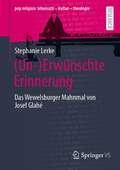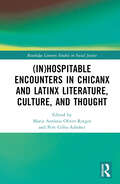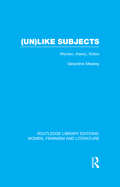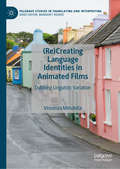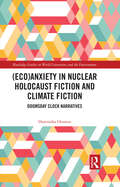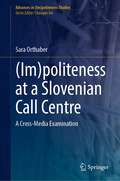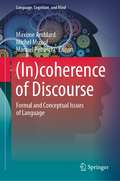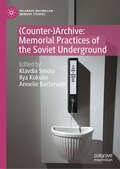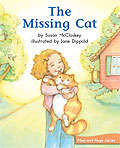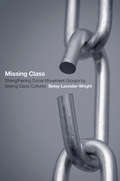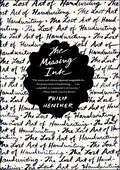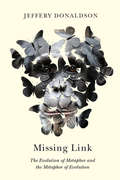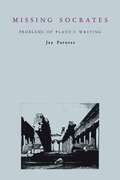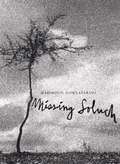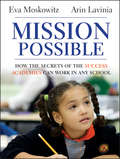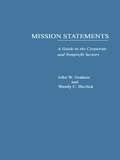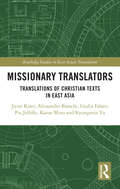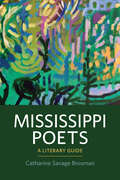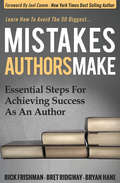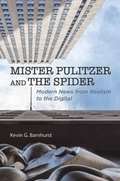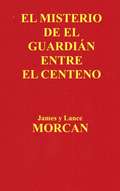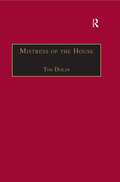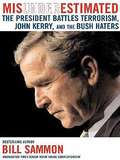- Table View
- List View
**Missing**: Das Wewelsburger Mahnmal von Josef Glahé (pop.religion: lebensstil – kultur – theologie)
by Stephanie LerkeAngesichts des Verstummens von Zeitzeug:innen und des Wiedererstarkens fremdenfeindlicher Motive und Mechanismen wie Antisemitismus, Rassismus und Rechtspopulismus ist Erinnerung an den Holocaust aktueller denn je. Gedenkstätten wie die „Erinnerungs- und Gedenkstätte Wewelsburg 1933 – 1945“ nahe Paderborn stellen in der gesellschaftlichen Erinnerungskultur als bildungspolitische Orte zur Erinnerung an die Opfer des Nationalsozialismus und der Mahnung an die leidvollen Ereignisse unter der nationalsozialistischen Diktatur eine notwendige Möglichkeit hierfür dar. Um sich mit dieser politisch sensiblen Geschichte und ihren aktuellen Erscheinungsformen auseinanderzusetzen, bedient sich die Wewelsburg des Ausdrucksmittels Kunst. Als erste umfassende interdisziplinäre Grundlagenforschung befasst sich dieses Buch mit jenem einzigartigen Stück bundesdeutscher Kunstgeschichte nach 1945, einer bildgewordenen, (un-)erwünschten Erinnerung aus einer theologischen Perspektive. Stephanie Lerke zeigt auf, dass das nachkriegsexpressionistische Wewelsburger Mahnmal von Josef Glahé den Betrachtenden durch sein breites Bildprogramm ein komplexes Themenfeld von historischen und theologischen Inhalten mit aktueller, erinnerungspolitischer Relevanz eröffnet. Sie verdeutlicht, wie dieses „zeitlose“ Medium mit seiner Fülle an Interpretationsspielräumen und Gegenwartsbezügen zur individuellen Spurensuche und Auseinandersetzung mit lebendiger Geschichte einlädt.
**Missing** (Routledge Literary Studies in Social Justice)
by Maria Antònia Oliver-Rotger and Pere Gifra-AdroherThis volume addresses the notion of (in)hospitality in the culture, literature, and thought of Chicanx and Latinx in the United States. It underscores those “stranger others” against whom nativist fear and state violence are directed: undocumented migrants, refugees, and asylum seekers. Critical analyses focus on the topics of immigration and state violence, hospitality in written and visual narratives, and the role of hospitality in the translation of academic and literary works. All essays explore the conditional character of hospitality towards Chicanx and Latinx and its attending myths and discourses. Dwelling on the predicament that individuals and groups face as strangers, unwelcome guests, and unwilling hosts, the essays also explore the ways in which Chicanx and Latinx writers, artists, and filmmakers may or may not challenge the guest-host relationship. The ethical concern that runs through the volume considers material history and the institutional, disciplinary regulation of the uncertainty of hospitality acts as factors determining the narratives about foreign others.
**Missing**: Women, Theory, Fiction (Routledge Library Editions: Women, Feminism and Literature)
by Gerardine MeaneyWhat is the relationship between feminist critical theory and literature? This book deals with the relationship between women and writing, mothers and daughters, the maternal and history. It addresses the questions about language, writing and the relations between women which have preoccupied the three most influential French feminists and three important contemporary British women novelists. Treating both fiction and theory as texts, she traces the connections between the theorists – Hélène Cixious, Luce Irigaray and Julia Kristeva – and the novelists – Doris Lessing, Angela Carter and Muriel Spark. This reading of the work of these six major women writers explores new forms of women’s identity, subjectivity and narrative and demonstrates how theoretical and literary texts can illuminate each other to bridge the gap between theory and literary criticism.
**Missing**: Dubbing Linguistic Variation (Palgrave Studies in Translating and Interpreting)
by Vincenza MinutellaThis book describes the dubbing process of English-language animated films produced by US companies in the 21st century, exploring how linguistic variation and multilingualism are used to create characters and identities and examining how Italian dubbing professionals deal with this linguistic characterisation. The analysis carried out relies on a diverse range of research tools: text analysis, corpus study and personal communications with dubbing practitioners. The book describes the dubbing workflow and dubbing strategies in Italy and seeks to identify recurrent patterns and therefore norms, as well as stereotypes or creativity in the way multilingualism and linguistic variation are tackled. It will be of interest to students and scholars of translation, linguistic variation, film and media.
**Missing**: Doomsday Clock Narratives (Routledge Studies in World Literatures and the Environment)
by Dominika Oramus(Eco)Anxiety in Nuclear Holocaust Fiction and Climate Fiction: Doomsday Clock Narratives demonstrates that disaster fiction—nuclear holocaust and climate change alike—allows us to unearth and anatomize contemporary psychodynamics, and enables us to identify pre-traumatic stress as the common denominator of seemingly unrelated types of texts. These Doomsday Clock Narratives argue that earth’s demise is soon and certain. They are set after some catastrophe and depict people waiting for an even worse catastrophe to come. References to geology are particularly important—in descriptions of the landscape, the emphasis falls on waste and industrial bric-a-brac, which is seen through the eyes of a future, post-human archaeologist. Their protagonists have the uncanny feeling that the countdown has already started, and they are coping with both traumatic memories and pre-traumatic stress. Readings of novels by Walter M. Miller, Nevil Shute, John Christopher, J.G. Ballard, George Turner, Paolo Bacigalupi, Maggie Gee, Ruth Ozeki and Yoko Tawada demonstrate that the authors are both indebted to a century-old tradition and inventively looking for new ways of expressing the Pre-TSS common in contemporary society. This book is written for an academic audience (postgraduates, researchers and academics) specializing in British Literature, American Literature, and Science Fiction Studies.
**Missing**: Doomsday Clock Narratives (Routledge Studies in World Literatures and the Environment)
by Dominika Oramus(Eco)Anxiety in Nuclear Holocaust Fiction and Climate Fiction: Doomsday Clock Narratives demonstrates that disaster fiction— nuclear holocaust and climate change alike— allows us to unearth and anatomise contemporary psychodynamics and enables us to identify pretraumatic stress as the common denominator of seemingly unrelated types of texts. These Doomsday Clock Narratives argue that earth’s demise is soon and certain. They are set after some catastrophe and depict people waiting for an even worse catastrophe to come. References to geology are particularly important— in descriptions of the landscape, the emphasis falls on waste and industrial bric- a- brac, which is seen through the eyes of a future, posthuman archaeologist. Their protagonists have the uncanny feeling that the countdown has already started, and they are coping with both traumatic memories and pretraumatic stress. Readings of novels by Walter M. Miller, Nevil Shute, John Christopher, J. G. Ballard, George Turner, Maggie Gee, Paolo Bacigalupi, Ruth Ozeki, and Yoko Tawada demonstrate that the authors are both indebted to a century- old tradition and inventively looking for new ways of expressing the pretraumatic stress syndrome common in contemporary society. This book is written for an academic audience (postgraduates, researchers, and academics) specialising in British Literature, American Literature, and Science Fiction Studies.
**Missing**: A Cross-Media Examination (Advances in (Im)politeness Studies)
by Sara OrthaberThis volume covers the field of linguistic (im)politeness in a particular mediated, customer-oriented setting. It is the first book to do so across telephone, email and social media. It offers key insights into a unique customer service setting through authentic and spontaneous data analysis. The book looks at how customers and agents of a large public transport company engage in transactional services and impolite behaviour. This text is directed at scholars and practitioners working in communication, business discourse, (socio)pragmatics, interaction studies, and social media interactions. It is also of great value to students in applied linguistics and scholars of Slavic languages, particularly Slovenian. The cross-media study is also of value to public/private institutions to reflect on their work practices, helping them improve existing customer–service provider relationships. The diverse readership and appeal are essential features of this book.Examines mediated institutional talk and impoliteness in the Slovenian languageCovers mediated service interactions, such as requests and complaints across three different mediaProvides in-depth insights into communication within a contemporary business environment
**Missing**: Formal and Conceptual Issues of Language (Language, Cognition, and Mind #10)
by Manuel Rebuschi Michel Musiol Maxime AmblardThis present book explores recent advances in modeling discourse processes, in particular, new approaches aimed at understanding pathological language behavior specific to schizophrenia. The contributors examine the modeling paradigm of formal semantics, which falls within the scope of both linguistics and logic while providing overlapping links with other fields such as philosophy of language and cognitive psychology. This book is based on results presented during the series of workshops on (In)Coherence and Discourse organized by SLAM (Schizophrenia and Language: Analysis and Modeling), a project developed to systemize the study of pathological language processing by taking an overarching interdisciplinary approach combining psychology, linguistics, computer science and philosophy. The principle focus is on conversations produced by people with psychiatric disorders such as schizophrenia and autism. The contributions come from young and experienced researchers, and invited speakers. The book appeals to likeminded students and researchers.
**Missing** (Palgrave Macmillan Memory Studies)
by Klavdia Smola Ilya Kukulin Annelie BachmaierThis book is the first major study exploring archival and memorial practices of the Soviet unofficial culture. The creation of counter-archives was one of the most important forms of cultural resistance in the Soviet Union. Unofficial artists and poets had to reinvent the possibilities of maintaining art and literature that “did not exist”. Against the background of archival theories and memory studies, the volume explores how the culture of the Soviet underground has become one of the most striking cases of scholarly and artistic (self-)archiving, which – although being half-isolated from the outer world – reflected intellectual and artistic trends characteristic of its time. The guiding question of the volume is how Soviet unofficial culture (de)constructed social memory by collecting, archiving and memorizing tabooed culture of the past and present.
The Missing Cat (Fountas & Pinnell LLI Green #Level I, Lesson 97)
by Susan MccloskeyFountas and Pinnell Leveled Literacy Intervention Green System -- 1st Grade
Missing Class
by Betsy Leondar-WrightMany activists worry about the same few problems in their groups: low turnout, inactive members, conflicting views on racism, overtalking, and offensive violations of group norms. But in searching for solutions to these predictable and intractable troubles, progressive social movement groups overlook class culture differences. In Missing Class, Betsy Leondar-Wright uses a class-focused lens to show that members with different class life experiences tend to approach these problems differently. This perspective enables readers to envision new solutions that draw on the strengths of all class cultures to form the basis of stronger cross-class and multiracial movements. The first comprehensive empirical study of US activist class cultures, Missing Class looks at class dynamics in 25 groups that span the gamut of social movement organizations in the United States today, including the labor movement, grassroots community organizing, and groups working on global causes in the anarchist and progressive traditions. Leondar-Wright applies Pierre Bourdieu's theories of cultural capital and habitus to four class trajectories: lifelong working-class and poor; lifelong professional middle class; voluntarily downwardly mobile; and upwardly mobile. Compellingly written for both activists and social scientists, this book describes class differences in paths to activism, attitudes toward leadership, methods of conflict resolution, ways of using language, diversity practices, use of humor, methods of recruiting, and group process preferences. Too often, we miss class. Missing Class makes a persuasive case that seeing class culture differences could enable activists to strengthen their own groups and build more durable cross-class alliances for social justice.
The Missing Ink: The Lost Art of Handwriting
by Philip HensherWhen Philip Hensher realized that he didn't know what a close friend's handwriting looked like ("bold or crabbed, sloping or upright, italic or rounded, elegant or slapdash"), he felt that something essential was missing from their friendship. It dawned on him that having abandoned pen and paper for keyboards, we have lost one of the ways by which we come to recognize and know another person. People have written by hand for thousands of years— how, Hensher wondered, have they learned this skill, and what part has it played in their lives? The Missing Ink tells the story of this endangered art. Hensher introduces us to the nineteenth-century handwriting evangelists who traveled across America to convert the masses to the moral worth of copperplate script; he examines the role handwriting plays in the novels of Charles Dickens; he investigates the claims made by the practitioners of graphology that penmanship can reveal personality.But this is also a celebration of the physical act of writing: the treasured fountain pens, chewable ballpoints, and personal embellishments that we stand to lose. Hensher pays tribute to the warmth and personality of the handwritten love note, postcards sent home, and daily diary entries. With the teaching of handwriting now required in only five states and many expert typists barely able to hold a pen, the future of handwriting is in jeopardy. Or is it? Hugely entertaining, witty, and thought-provoking, The Missing Ink will inspire readers to pick up a pen and write.
Missing Link
by Jeffery DonaldsonWe look for missing links in the sciences and humanities, but the essential missing link - metaphor - is always in front of us. In Missing Link, Jeffery Donaldson unites literary criticism and evolutionary and cognitive science to show how metaphor has been with us since the beginning of time as a seed in the nature of things. With examples from centuries of poets, critics, philosophers, and scientists, he details how metaphor is a chemistry, an exchange of energies forming and dissolving, and an openness in the spaces between things. He considers the ways in which DNA learns how to liken things that have been, how mutation makes errors and then tries them on, and how evolution is hypothesis - nature's way of "thinking more." The mind is a matrix of relations: neural synapses cascade into ever-changing pathways and patterns. Metaphor is the substance of things hoped for, the evidence of things not seen. It is the unbroken thread between matter and spirit. Whether offering analysis of a turn of phrase or chemical reaction, Missing Link presents a vision of literature that is also a vision of the cosmos, and vice versa. It enters the debate between evolution and religion, and challenges scientists, literary theorists, and religious advocates to rethink the relations between their disciplines.
Missing Link: The Evolution of Metaphor and the Metaphor of Evolution
by Jeffery DonaldsonWe look for missing links in the sciences and humanities, but the essential missing link - metaphor - is always in front of us. In Missing Link, Jeffery Donaldson unites literary criticism and evolutionary and cognitive science to show how metaphor has been with us since the beginning of time as a seed in the nature of things. With examples from centuries of poets, critics, philosophers, and scientists, he details how metaphor is a chemistry, an exchange of energies forming and dissolving, and an openness in the spaces between things. He considers the ways in which DNA learns how to liken things that have been, how mutation makes errors and then tries them on, and how evolution is hypothesis - nature's way of "thinking more." The mind is a matrix of relations: neural synapses cascade into ever-changing pathways and patterns. Metaphor is the substance of things hoped for, the evidence of things not seen. It is the unbroken thread between matter and spirit. Whether offering analysis of a turn of phrase or chemical reaction, Missing Link presents a vision of literature that is also a vision of the cosmos, and vice versa. It enters the debate between evolution and religion, and challenges scientists, literary theorists, and religious advocates to rethink the relations between their disciplines.
Missing Socrates: Problems of Plato's Writing (G - Reference, Information and Interdisciplinary Subjects)
by Jay FarnessPlato's conversations of Socrates are among the most accessible philosophical texts most of us have ever read, yet the more one pursues the art or intelligibility of this writing, the more mysterious and paradoxical the Platonic texts become. What does it mean to study Plato, not philosophically as a maker of arguments, not poetically as a maker of dialogues, but literally as a maker of texts? This is a question that Jacques Derrida has made his own, and in this book Farness creates a dialogue with Derrida on Plato's texts.Missing Socrates also provides a dialogue between Plato and Socrates on the question of speech versus writing and a study of the materiality of Plato's writing. Included among the various dialogues and themes developed here are rhetoric and courtroom practice in the Apology of Socrates; religion, skepticism, and the idea of transcendence in the Euthyphro; artistic practice and tradition in the Ion; education and political discipline in the Charmides; and rhetoric, writing, commemoration, and the motives of authorship in Phaedrus. In each of these discursive settings, Socrates unsuccessfully seeks a place or a mode for philosophy; Farness shows that the dialogues of Plato uncannily supply that lack.
Missing Soluch: A Novel
by Mahmoud DowlatabadiPerhaps the most important work in modern Iranian literature, this starkly beautiful novel examines the trials of an impoverished woman and her children living in a remote village in Iran, after the unexplained disappearance of her husband, Soluch. Lyrical yet unsparing, the novel examines her life as she contends with the political corruption, authoritarianism, and poverty of the village. It follows her vacillations between love for Soluch and anger at his absence, and her struggle to raise her children without their father. The novel critically evokes the unfulfilled aspirations of modern Iran -- portraying a society caught between a past and a future that seems equally weighted down by injustice. This landmark novel -- poineering the use of the everyday language of the Iranian people --revolutionized Persian literature in its beautiful and daring portrayal of the life of a marginal woman and her struggle to survive. Missing Souluch is published with the support of the Association of American Publishers' Freedom-to-Publish Committee, assisting in the publication of voices censored by the U. S. State Department's ban on books from the "Axis of Evil. "
Mission Possible: How the Secrets of the Success Academies Can Work in Any School
by Eva Moskowitz Arin LaviniaStrategies for making the schools we need that work for all kidsEva Moskowitz (the founder and CEO of the Success Charter Network in Harlem) and Arin Lavinia offer practical, classroom-tested ideas for dramatically improving teaching and learning. Moskowitz and Lavinia reveal how a charter school in the middle of Harlem, enrolling neighborhood children selected at random, emerged as one of the top schools in New York City and State within three years. The results of the Harlem school were on a par with public schools for gifted students and elite private schools.Describes what can be accomplished when students and adults all work to focus on constant learning and performance improvement; DVD clips can be accessed using a special link included in the book.The Success Academies have been featured in two popular and widely distributed documentaries, Waiting for Superman and The LotteryDetails the Success Academies' THINK Literacy curriculum, which produces dramatic results in student's reading and writing skillsIn addition to providing strategies and lessons for school leaders and teachers, Secrets of the Success Academies also serves as a guide for parents, policymakers, and practitioners who are passionate about closing the academic achievement gap.
Mission Statements: A Guide To The Corporate And Nonprofit Sectors
by John W. Graham Wendy C. HavlickFirst published in 1994. Routledge is an imprint of Taylor & Francis, an informa company.
Missionary Translators: Translations of Christian Texts in East Asia
by Jieun Kiaer Alessandro Bianchi Giulia Falato Pia Jolliffe Kazue Mino Kyungmin YuExploring the history of missionary translation of Christian texts in East Asia, Missionary Translators offers a comparative perspective between the features of East Asian languages and the historical context of the translation. Focusing on the Bible and Christian theological works, it looks at the intersection of linguistics, translation studies, and history. This book discusses the real-life challenges faced by missionary translators in producing Christian texts in East Asian languages. Students, historians, scholars and those interested in the study of East Asian cultures or translation will find this book to be an insightful and invaluable resource.
Mississippi Poets: A Literary Guide
by Catharine Savage BrosmanMississippi has produced outstanding writers in numbers far out of proportion to its population. Their contributions to American literature, including poetry, rank as enormous. Mississippi Poets: A Literary Guide showcases forty-seven poets associated with the state and assesses their work with the aim of appreciating it and its place in today’s culture. In Mississippi, the importance of poetry can no longer be doubted. It partakes, as Faulkner wrote, of the broad aim of all literature: “to uplift man’s heart.” In Mississippi Poets, author Catharine Savage Brosman introduces readers to the poets themselves, stressing their versatility and diversity. She describes their subject matter and forms, their books, and particularly representative or striking poems. Of broad interest and easy to consult, this book is both a source of information and a showcase. It highlights the organic connection between poetry by Mississippians and the indigenous music genres of the region, blues and jazz. No other state has produced such abundant and impressive poetry connected to these essential American forms.Brosman profiles and assesses poets from the twentieth and twenty-first centuries. Grounds for selection include connections between the poets and the state; the excellence and abundance of their work; its critical reception; and both local and national standing. Natives of Mississippi and others who have resided here draw equal consideration. As C. Liegh McInnis observed, “You do not have to be born in Mississippi to be a Mississippi writer. . . . If what happens in Mississippi has an immediate and definite effect on your work, you are a Mississippi writer.”
Mistakes Authors Make: Essential Steps for Achieving Success as an Author
by Rick Frishman Bret Ridgway Bryan Hane&“Features 50 of the most common errors book authors make in writing, publishing, and promoting their books.&” —John Kremer, author of 1001 Ways to Market Your Books The publishing landscape can be a tricky one to navigate. There are so many aspects to authoring and publishing a book that it&’s easy for you to make critical mistakes that can set you off course and significantly decrease your chances for success. How many of the 50 biggest author mistakes are you making? When you learn to avoid them, you can greatly enhance your chances for success in the publishing world. In this insider&’s look at the worlds of publishing and book marketing coauthors Rick Frishman, Bret Ridgway, and Bryan Hane bring their 65 combined years of experience in the publishing world to you and share their secrets to success. You&’ll learn: How to master media and other key marketing channels authors should useKeys to capturing the browsing buyer in bookstores and onlineThe new publishing landscape and how it impacts youHow to increase the readability of your book so readers keep coming backHow your book is the key piece of your own information marketing empireAnd much, much more &“If you want to write a book or make sure that your book is a smashing success read this now and take action! You&’ll be amazed at the difference it will make in your success!&” —John Assaraf, New York Times–bestselling author of Innercise and The Answer &“I LOVE the book so far! Clear-concise-comprehensive with practical info the aspiring author needs!&” —Laura Venecia Rodriguez, author of Yoga at Home
Mister Pulitzer and the Spider: Modern News from Realism to the Digital
by Kevin G BarnhurstA spidery network of mobile online media has supposedly changed people, places, time, and their meanings. A prime case is the news. Digital webs seem to have trapped "legacy media," killing off newspapers and journalists' jobs. Did news businesses and careers fall prey to the digital "Spider"? To solve the mystery, Kevin Barnhurst spent thirty years studying news going back to the realism of the 1800s. The usual suspects--technology, business competition, and the pursuit of scoops--are only partly to blame for the fate of news. The main culprit is modernism from the "Mister Pulitzer" era, which transformed news into an ideology called "journalism." News is no longer what audiences or experts imagine. Stories have grown much longer over the past century and now include fewer events, locations, and human beings. Background and context rule instead. News producers adopted modernism to explain the world without recognizing how modernist ideas influence the knowledge they produce. When webs of networked connectivity sparked a resurgence in realist stories, legacy news stuck to big-picture analysis that can alienate audience members accustomed to digital briefs.
El Misterio de el Guardián Entre el Centeno
by James Morcan Lance Morcan Pedro Rafael Gómez BarrosoEl Misterio de El guardián entre el centeno, de James Morcan y Lance Morcan Descubriendo los misterios que rodean al clásico de J.D. Salinger. “El Misterio de El guardián entre el Centeno saca a la luz los misterios de la famosa novela de 1951 “El guardián entre el Centeno”, de J.D. Salinger – probablemente la novela más controvertida de todos los tiempos. Conocida para muchos por representar la máxima expresión de la ansiedad en la adolescencia, esta novela ha sido catalogada como inmoral por distintos grupos sociales. De hecho, a lo largo de las décadas se ha prohibido su difusión en algunos estados norteamericanos. No obstante, el principal motivo que incentivó la prohibición de esta novela fue la implicación directa o la asociación del libro con algunos de los asesinatos más infames y crueles acaecidos en el siglo XX. Entre estos crímenes se incluyen el asesinato de John Lennon y el intento de asesinato del Presidente Reagan. De este modo, se acusa a Salinger (y/o la editorial) de ingeniárselas astutamente para llenar su libro de pasajes neurolingüísticos, o mensajes ocultos, que actúan como sugestión post-hipnótica o controlan la mente. Y así, todos estos mensajes posibilitaron a los agentes de la CIA la creación de “Candidatos Manchúes”, es decir, asesinos controlados mentalmente por el Gobierno. Muchos son los que piensan que la novela formó parte del amplio programa de control mental de la CIA, ya desclasificado en su mayoría, conocido como MK-Ultra, y que mientras los asesinos eran sometidos a un lavado de cerebro, también eran obligados a leer y releer la historia hasta que calase en sus mentes. Los Morcans investigan estas teorías con sus argumentos en "El Misterio de El guardián entre el centeno" – el cuarto libro de The Underground Knowledge Series. Esta equilibrada explicación finalmente le deja a usted, el lector, la decisión de si la novela de J.D. Salinger
Mistress of the House: Women of Property in the Victorian Novel (The Nineteenth Century Series)
by Tim DolinThis exploration of gender and property ownership in eight important novels argues that property is a decisive undercurrent in narrative structures and modes, as well as an important gender signature in society and culture. Tim Dolin suggests that the formal development of nineteenth-century domestic fiction can only be understood in the context of changes in the theory and laws of property: indeed femininity and its representation cannot be considered separately from property relations and their reform. He presents original readings of novels in which a woman owns, acquires or loses property, focusing on exchanges between patriarchal cultural authority, the 'woman question' and narrative form, and on the place of domestic fiction in a culture in which property relations and gender relations are subject to radical review. Each chapter revolves around a representative text, but refers substantially to other material, both other novels and contemporary social, legal, political and feminist commentary.
Misunderestimated: The President Battles Terrorism, John Kerry, and the Bush Haters
by Bill SammonConservative political analyst offers his opinions on the Bush presidency with a focus on foreign policy. Includes exclusive interviews with the president and his advisers.
